MercoPress. South Atlantic News Agency
Tag: British Antarctic Survey
-
Wednesday, December 12th 2012 - 20:49 UTC
HMS Protector inspecting Antarctic Treaty sites; first visit to Brazil’s Comandante Ferraz station
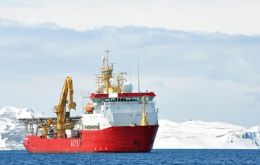
Royal Navy Ice patrol HMS Protector has arrived in Antarctica for the first time this season after her long sail south from Portsmouth. She will spend this, the first of her four work periods in the ice this Austral Summer, supporting an international team conducting formal Antarctic Treaty inspections of sites across the Peninsula.
-
Friday, November 16th 2012 - 04:22 UTC
Cameron and Piñera discuss Falklands, Antarctic cooperation and confirm close links
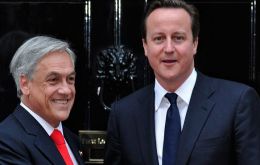
Visiting Chilean president Sabastian Piñera and PM David Cameron reaffirmed the two countries long standing close relations, pledged to increase trade and acknowledged their views on the Falkland Islands and the coming referendum during a meeting on Thursday at 10 Downing Street.
-
Wednesday, October 10th 2012 - 19:33 UTC
BAS merger plan triggers debate; fears of ‘diminished’ British presence in Southern Ocean
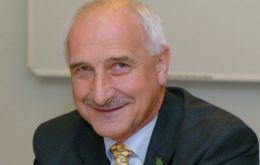
UK government plans to merge the British Antarctic Survey with the National Oceanography Centre have triggered global debate among scientists and politicians with former US Vice-president Al Gore wading into the discussion and fears in the Falkland Islands of a diminished “British presence” in the region.
-
Friday, August 10th 2012 - 22:37 UTC
Ice patrol HMS Protector crew to visit the affiliated city of Cambridge

The university city of Cambridge might be more used to punts, but it is about to welcome the crew of a Royal Navy ship. HMS Protector, the Navy's 5.000-ton Antarctic patrol vessel is to visit the region on Monday, marking her first visit to her affiliated city of Cambridge since the formal link was established a year ago.
-
Thursday, June 28th 2012 - 20:23 UTC
HMS Protector back in Portsmouth after seven months in Antarctica duties

Royal Navy ice patrol ship HMS Protector returned to Portsmouth on June 27 from her maiden deployment. The 5.000-ton ice-breaker spent most of her seven months away surveying and patrolling the Antarctic Peninsula.
-
Wednesday, April 18th 2012 - 17:58 UTC
Ice patrol HMS Protector prepares to return after a first successful deployment

The Navy’s Antarctic patrol ship HMS Protector this week ventured further south than ever before on her maiden deployment as she delivered vital supplies to polar scientists.
-
Monday, March 19th 2012 - 14:42 UTC
HMS Protector dares ice pack to pick up scientists in remote Antarctic island

The Royal Navy’s Antarctic patrol ship HMS Protector had to punch her way through ice to first deliver, then pick up a team of scientists as the pack ice threatened to trap them – and the ship.
-
Thursday, February 16th 2012 - 21:13 UTC
UK Science minister calls in the Falklands en route to Antarctica tour
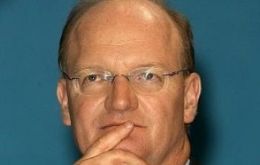
Science and Universities Minister David Willetts has become the latest UK politician to visit the Falklands. A spokesman for Mr Willetts said he would make on Thursday a “transiting visit” en route to an engagement in Antarctica.
-
Monday, January 16th 2012 - 19:20 UTC
Minister recalls Captain Scott’s South Pole feat and heralds work of UK polar scientists

On the eve of the centenary of Royal Navy Captain Robert Scott reaching the South Pole, Foreign Office Minister Henry Bellingham has heralded the work of British polar scientists in helping to shape the understanding needed for managing climate change and contributing to the UK’s work for the peaceful protection of Antarctica.
-
Wednesday, January 4th 2012 - 17:37 UTC
Pale octopus and yeti crabs found surrounding hydrothermal vents near Antarctica
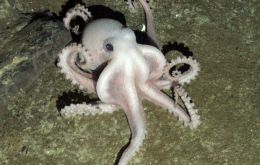
Communities of species previously unknown to science have been discovered on the seafloor near Antarctica, clustered in the hot, dark environment surrounding hydrothermal vents.
